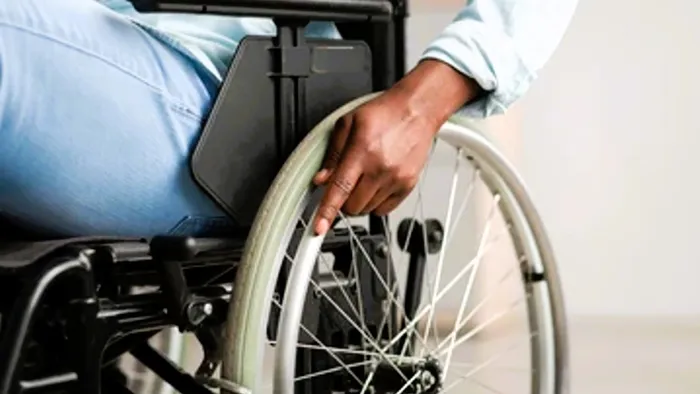
AS SOUTH Africa observes National Disability Rights Awareness Month, disability rights advocates highlight the persistent gaps between policy and practice.
Image: SUPPLIED
AS SOUTH Africa observes National Disability Rights Awareness Month, disability rights advocates highlight the persistent gaps between policy and practice.
Despite progressive legislation, people with disabilities continue to face barriers in education, employment, transport and housing.
Experts call for practical implementation of inclusive policies and systemic changes to create genuine accessibility rather than mere compliance.
Veetha Sewkuran, president of the KwaZulu Natal Blind and Deaf Society, said people with disabilities continued to face numerous barriers to full inclusion.
These include limited access to quality education and training, which affected their employability and career growth.
“Many workplaces remain physically inaccessible and lack assistive technology or reasonable accommodation. Discrimination and stigma also persist, leading to fewer job opportunities and limited participation in mainstream sports, recreation, and social activities.
“Public transport, infrastructure, and communication systems are still not fully inclusive, which further isolates people with disabilities and restricts their independence,” she said.
Sewkuran said while progress had been made through legislations such as the Employment Equity Act, and initiatives promoting disability rights, not enough was being done in practice.
“Implementation is inconsistent, and many organisations treat inclusion as a compliance issue rather than a genuine commitment to equality. There is a gap between policy and real-life accessibility, both in workplaces and in communities. Awareness and understanding of disability inclusion remain low, particularly in rural areas.”
Sewkuran added that there needs to be a stronger focus on practical implementation of inclusive policies.
“Employers should be encouraged and supported to create accessible workplaces and provide reasonable accommodations. Education systems must prioritise inclusive learning from early childhood to tertiary level, ensuring equal access to technology, interpreters, and support staff.
“Public and private sectors should collaborate to create sustainable employment and entrepreneurship opportunities for people with disabilities. Moreover, disability awareness campaigns and community training should be intensified to challenge stereotypes and promote respect, inclusion, and dignity for all,” she said.
Mphokuhle Ngidi, the social work manager of the Association for the Physically Challenged, said there were not enough employment opportunities, educational institutions, accessible transport, or accessible and conducive houses for people with disabilities.
“Many face the challenge of not meeting job requirements, as some positions require a Matric certificate or other qualifications, of which they were unable to obtain due to the nature of their disabilities.
Ngidi said people with disabilities continued to face stigma and discrimination, especially from society.
“Children with physical disabilities are often rejected by schools, and there are not enough educational institutions that cater specifically to their needs. Mainstream schools are still not fully inclusive or adequately equipped to support learners with physical disabilities.
“Many people with disabilities live in environments that are not suitable for their specific needs, there are limited accessible houses for people with disabilities. They try to apply for RDP houses but only a small number of these applications are successful, leaving many to continue living in conditions that are not conducive to their disabilities,” she said.
Nabeela Brown, branch manager of The Living Link, said one of the biggest challenges people with disabilities faced with regard to employment was “simply being given a fair chance”.
The national non-profit organisation caters for the intellectually disabled and learning challenged community.
“Many employers still don’t fully understand disability or how small adjustments can make a big difference. Because of this, people are often overlooked - not because they can’t do the work, but because the workplace isn’t set up to include them. Many employers still hold misconceptions about what persons with disabilities can or can’t do, which often leads to exclusion or tokenistic hiring rather than meaningful inclusion.”
Brown, who is also an occupational therapist, said however, she believes there were significant efforts to promote the inclusion of persons with disabilities.
“I do think we are moving in the right direction. South Africa has strong legislation and there are many organisations working tirelessly to advocate for awareness and equal rights. We are also seeing more representation in the media, which is encouraging and helps shift public perception.
“However, the real challenge lies in implementation. So while the framework is there, we need more consistent follow-through and accountability to make inclusion a lived reality, not just a policy on paper,” she said.
Brown did say there was a need for more focus on creating a society of true inclusion.
“It must be one that celebrates diversity in all its forms rather than seeing disability as something separate. This means moving beyond awareness campaigns and really looking at how we design our systems, spaces, and opportunities. If we implement the principles of universal design, where environments, education and workplaces are accessible to everyone from the start, we won’t need to create special spaces for persons with disabilities. Inclusion will simply be part of how things work.”
Dr Sunshine Myende, chairperson of the National Youth Development Agency's (NYDA) executive board, said the agency saw every young person as a source of potential and power.
“For the NYDA, inclusion is not an act of charity, it is the cornerstone of justice. Youth with disabilities must not stand at the margins of transformation. Instead, they must be found at its very centre, shaping the economy, influencing policy, and redefining what progress means in South Africa.”
Myende said that under the current board's strategic vision, inclusivity and accessibility were central pillars.
“The NYDA recognises that sustainable national development is unattainable as long as young people with disabilities face systemic barriers to opportunity. To address this, the agency has finalised its disability strategy in line with its mother department, the Department of Women, Youth and Persons with Disabilities, and the Cabinet’s strategic priorities.
“The strategy forms part of the broader national programme, but focuses on the agency’s scope of operations, with an emphasis on rural communities, advocacy interventions, and policy-oriented campaigns,” she said.
THE POST
Related Topics: